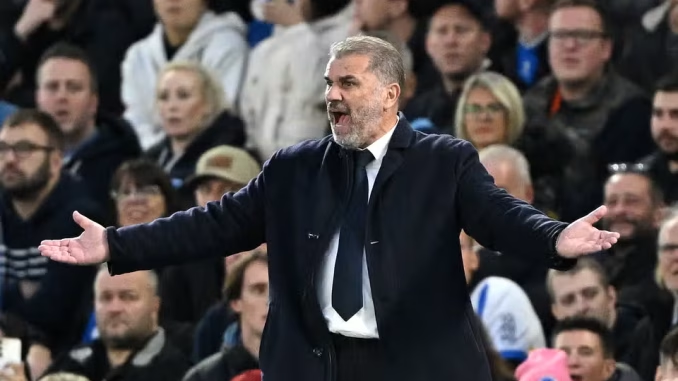
As a grim-faced Ange Postecoglou ripped into his Tottenham players at the Amex Stadium on Sunday, it was impossible not to recall another Spurs manager destroying his squad after a collapse on the English south coast.
Postecoglou’s criticism of his team after they squandered a 2-0 half-time lead to lose 3-2 to Brighton was far less open and violent than Antonio Conte’s leaving outburst following the 3-3 draw with Southampton in March 2023, but there were remarkable similarities in their statements.
Both Conte and Postecoglou termed the situations as “unacceptable,” and both criticized their Tottenham players’ fighting spirit and “competitiveness.”
“We didn’t do what you need to do at this level, it’s kind of non-negotiable,” Postecoglou stated in his post-match press conference. “We simply weren’t competitive. We didn’t win our duels, we lacked intensity, and we failed to deliver the fundamentals of the game at this level, and we paid the price.”
Contrast this with Conte’s statement 18 months ago at St Mary’s: “I can tell you that if you want to be competitive, if you want to fight, you have to improve this aspect.”
To be clear, Conte was far more harsh than Postecoglou, and the Italian would go on to argue that his players’ lack of fight was a symptom of the club’s culture under chairman Daniel Levy in a now-infamous outburst following what would be his final game in charge of Spurs.
For Conte, Spurs losing a two-goal lead with 16 minutes remaining to draw 3-3 was the breaking point, the climax of what he saw as a season of cowardly performances.

“What has been happening in the last few months, what’s happening in this, my second season,” he repeated. “I think that it’s the right moment to speak.”
Postecoglou, on the other hand, was taken aback by the defeat against Brighton, speculating that it could have been the result of complacency after five consecutive wins across all competitions.
“I haven’t seen it before, and I certainly didn’t feel like that’s the way the game was going to go,” he told the audience.
Both Postecoglou and Conte, however, made a similar point regarding their players’ mentalities, emphasizing that Tottenham’s failings were not due to tactics or quality, but rather a lack to demonstrate the essential passion and dedication on the field.
“I am not speaking about the tactical or technical aspect,” Conte remarked, while Postecoglou minimized the relevance of his substitutions and Spurs’ missing players, frequently referring to his team’s “level of competitiveness”.
Surprisingly, just four players who appeared in Conte’s final game played on Sunday: Cristian Romero, Pedro Porro, Dejan Kulusevski, and Pape Matar Sarr.
Postecoglou’s squad has almost completely changed from the one he inherited; there is a gaping Harry Kane-shaped hole, but the current group is universally regarded as more technical and well-rounded.
Despite the enormous churn of players, Postecoglou saw the same flaws this weekend that so irritated Conte and, arguably, have been a characteristic of Spurs teams for generations.
Spurs’ defeat at the Amex was the tenth time they have lost a Premier League game after leading by two or more goals, more than any other club in history.
Perhaps Brighton was a one-off for Postecoglou’s Spurs, an acceptable glitch in the development of a young squad, but for all the talk about the club’s DNA since the Australian’s appointment, perhaps a soft centre is now as ingrained as a love for exciting play.
Conte’s parting words against Southampton were a sobering reminder that Spurs might change managers, but the same flaws would linger once he left.

“They can change managers, plenty of managers, but the situation will not alter. “Believe me,” he stated.
The most essential element to note, however, is that Postecoglou is committed to repairing Spurs and is willing to accept responsibility for his team’s shortcomings, whereas Conte showed little interest in finding a solution to the club’s problems, which he blamed solely on his players.
Conte’s outburst felt like a farewell to a club for which he never had much affection, a scorched-earth attack on his squad, a come-and-sack-me plea to the board, and, ultimately, an attempt to shift the blame for a disastrous season away from his own coaching failures.
The day after the game, he flew to Italy, where he normally goes at the start of international breaks, with no plans to return to Tottenham.
Postecoglou, on the other hand, has made it clear that his mandate is to improve the club’s culture as well as its style of play, and he will spend this international break reflecting on what he termed as a “new experience” and devising strategies to prevent it from happening again.
In sharp contrast to his predecessor, Postecoglou concluded his press conference by acknowledging Spurs’ weaknesses and looking ahead.
“It’s for me to address and fix, and the responsibility falls at my feet and that’s what I need to do,” he told me.
Leave a Reply